A friend, Meghan Fournoit, who regularly writes for Crossport Innerview, a newsletter for this Cincinnati-based support group, interviewed our friend Jack Brennan. Here is her interview.
For years, gender non-conformance was at best kept quiet and at worst resulted in serious personal loss or even death. This is not news for anyone within the “TG” umbrella. Within the last number of years, Trans folx have been thrust into the spotlight, with both positive and negative results. Despite attempts to use Trans identities as a political device issue, society seems to be progressing in acceptance of folx in this spectrum. While most of the progress has been with Trans people that have completed or are in process of a transition, there are still segments of our community that are not as well represented in public. Certainly, our drag cousins are well represented, ala Ru Paul. Like her or not, Caitlyn Jenner has raised awareness of late transition. There are several younger folx like Jazz Jennings that also have very visible lives. However, the “common Cross Dresser” is not that well represented.
This is somewhat perplexing. If you read currently available literature, the estimated prevalence of Cross Dressing is somewhere between 2 and 10 percent of the general population. Five percent is commonly agreed upon. Considering that the current estimate of Transgender people (those with GID or that identify as non-cis gender) is between 0.25 to 0.5 percent, the incidence of Cross Dressing is 10 to 20 times more common. In other words, for every person that has at least seriously considered gender transition or does not identify as the gender they were assigned at birth, there are 9 to 19 people that have at least temporary significant gender non-conforming characteristics. Yet this population is less recognized, understood or addressed by the general population.
As readers of the Innerview likely know, there are a multitude of reasons non-conforming individuals eschew being “Out”. For some, keeping this part of themselves private is so imperative that they do not divulge it to even their closest confidants. Others may share this anonymously with people they do not think will recognize them or interact with other parts of their lives. Some will be open with a very select set of individuals; a spouse, a sibling or other family member, a close friend, or perhaps a counselor or health provider. There are those that participate in local or limited public situations, widening the circle of people that know about them. In rare instances, there are some that are willing to have a much larger public presence, which could include media exposure and dropping the defense of obscurity. In observation, the number of acutely Transgender people versus Cross Dressing folx that accept this most public disclosure is high. A greater need to adopt their gender expression on a more consistent basis may be a major factor. Because of this, it is even rarer that someone that fits the “common Cross Dresser” description would be willing to brave public recognition through the media.
The list of reasons Cross Dressers (and other TG folx) choose to avoid disclosure can be exhaustive. Most of these reasons hinge on a level personal safety. If Cross Dressing were widely accepted, there would be far less need to hide the activity. Ironically, the result of keeping these feelings and behaviors hidden tends to compound unacceptance by the public. This is often mirrored in the mind of those who Cross Dress. This results in fear, secrecy, self-loathing, non-acceptance of others, suspicion and a host of other negative self-protective reactions. Broader acceptance of Cross Dressing would augment the ability to combat both the self-inflicted and outside inflicted damage. Much can be learned from the gains by other parts of the LGBTQ+ community. One of the best methods for increased acceptance is positive public representation. Authentic and personal aspects of individuals tend to resonate well with the public resulting in a more empathetic perception.
Recently the Cincinnati region has had such an individual come forward. Retired Bengals PR director Jack Brennan has boldly stepped into the limelight and announced that he enjoys Cross Dressing. Jack’s revelation has been covered nationally and local, in print and television. This issue contains and interview with him. When reading the interview, it’s important to keep in mind that his journey, fears, joys and acceptance is much like many of us, especially in context of the environment that we’ve come from. Sometimes isolated, it takes a lot of conviction to get to self-realization and eventually to go beyond our own comfort level. The hope is that the more positive examples we have, the less isolated and stronger we can be.
Jack Brennan recently came out publicly, in the media, as a Cross Dresser and self identifies as “queer”. I found it very inspiring that someone from a typically macho environment would have the courage to do so. I was also excited that this was a local phenomenon. The fact that I was unaware of Jack’s proclivity or had not met him through Crossport reminded me that much of our community lacks cohesion. I was also surprised that Crossport had not made a larger effort to reach out. Fortunately, a friend of mine had contacted Jack for an interview for her blog, Kandi’s Land. Kandi was kind enough to make the introduction, since I was concerned about being overbearing by a cold call.
Jack agreed to an interview, which I conducted by first sending him a list of questions. I rounded out his answers with an in-person meeting over lunch. Typically, lunch was a conversation. Jack was gracious and asked as many questions about myself as I asked of him.
Do you prefer to go by Jack or Jackie?
I like both, really. I’d tell people, “You choose which one feels right to you, and I’ll gently let you know if I’m preferring the other.”
How about pronouns? Do you have a preference or any strong feelings about them?
No strong feelings, it’s similar to the two names. I’m fine with male pronouns as my base, but if you want to use the female for me when I’m dressed, I will probably like that. I remember one CD I met years ago who was very put out when someone called her by the male pronouns. I honor folks’ personal choices and needs on that, but this is just not a big area of concern for me.
You’ve public come out as a crossdresser and have used the term queer. Can you elaborate a bit on that? What is your connotation of the term “queer”?
I am totally grateful to the folks in the LGBTQ community who pioneered the taking-back of the term “queer” from the fearful and bigoted. I take the meaning of queer to be “non-conforming to mainstream cultural standards of gender and sexuality,” and certainly by that standard I am queer. I am proud to proclaim my kinship with other queers. I don’t mean to compare the LGBTQ struggle overall with the struggle of people of color, but I hope it’s not seen as any disrespect to Black people to say that us taking back “queer” from the bigots is not unlike Blacks taking back the n-word. Also, I realize that some people, probably more among older folks, were so injured by the word “queer” when hateful people controlled it that they still cannot abide it to this day. I would hope that some of them can slowly get comfortable with the new, positive, joyful meaning of the term.
While you’ve certainly spent most of your life in a Male gender role, do you see yourself as bi-gender, gender fluid, or gender non-conforming? Do you feel that your experience would fit the category of transgender?
I guess I would say “gender non-conforming.” I self-identify as male; I don’t feel I was “born in the wrong body.” But I’ve always had a powerful urge to experience the feel of being female through all forms of “dressing.” I see myself as “on the transgender spectrum” but not in the same place as true transsexuals desiring permanent gender change.
From some other interviews, you’ve indicated that you first discovered a penchant for dressing up in female clothing at a very early age, and that you introduced the subject to your bride on your honeymoon by appearing in make-up. Could you describe your early journey a little bit more?
As I think you know already, I first felt the urge when I was not quite four and acted on it, swapping clothes briefly with a neighbor girl my age whose home I was visiting with my mother. I did appear in makeup to my wife Valerie on our honeymoon, but that was not a full coming-out. We were in New Orleans and had gone to drag shows, and that inspired me to give it a try and get her reaction. She did not react positively – no big surprise there to any readers I bet – but we both just passed it off at the time as a silly stunt best forgotten. It was a couple years later when I determined that trying to hide cross-dressing in a marriage would be nuts. I fully opened up to her at that time, and then began the long and slow journey over many years of us learning to live with it and my freedom to dress becoming greater. I am beyond lucky in having such an understanding wife who loves me so much, and I love her deeply as well.
In pressing for more information about his journey Jack related more on his career and family life. Jack go his professional career writing for newspapers in Dallas, then Memphis, and wound up writing for the Cincinnati Post and then the Enquirer. From there he made the transition to the Bengals. While Jack had introduced his wife to Jackie, he kept it low key, and it took some time to become more transparent. Over time, Jack was able to be more open with his wife and she even participated to a degree. Jack’s children did not know about Jackie until a bit later in life when his wife told them. Their experience with Jackie is somewhat limited, which is unsurprising since Jackie is not really part of the family’s daily life.
How did you learn about make-up and “tricks of the trade”?
Trial and error, trial and error, trial and error. It would be fun to compare notes on that sometime with other CDs.
Where there any notable successes or failures along the way? How did you secure clothing and accouterments?
I’m combining those two questions. My “nightmare” experience came when I was in my 20s and was compelled to purchase a pair of gleaming white heels from a store where I had to deal with a clerk (male). He made me feel rather humiliated, but I survived it and moved on. Buying stuff was so difficult and scary for so many years, but now I am totally uninhibited about it, whether shopping in drag or drab.
Jack indicated that Valerie has been helpful on occasion in this department and had pressed Jackie to get some decent forms prior to participating in “Be-All” in Chicago. She went with him the first time but declined the second.
Prior to sharing with your wife, were there any other people that knew about this part of you?
No. I felt for years that I would never be able to tell a single soul in my entire life. But after I determined Valerie absolutely had to know, slowly over the years the list of clued-in people grew.
Denial and self-rejection and isolation are pretty common for cross dressers and transgender folx. When did you get to a self-realization and acceptance? Was there a specific event or epiphany that solidified this?
I consider myself very fortunate to have had only a low level of self-rejection. I always knew that what I was doing was totally unacceptable in society, but I knew deep down it was culture’s fault and not my own. Not that I haven’t suffered some internalized homophobia, but it has been manageable. When I think about why, I just credit my parents for instilling a good self-concept. But they never knew before passing away.
You had quite a career since revealing yourself to you wife, and clearly discretion was important during those years. Was your cross dressing purely a private, at home activity, or did you foray into the public presenting as Jackie?
I determined by my late 20s that staying home all the time just would not cut it. I fearfully and tentatively began venturing out, largely unbeknownst to Valerie. It has been a long and slow process to acquire the uninhibitedness I have now.
How did you meet friends while in Jackie mode?
Basically, I didn’t. I was always “alone” in public, trying to stay anonymous, because I felt I could not share Jackie’s existence with friends, particularly because of my jobs in sports. Now of course that has all changed. Since coming out publicly, I’ve arranged several outings with straight friends, male and female, from my media/sports world. They have been as fun for me as a kid going to an amusement park, and the other folks seem to have roundly enjoyed it as well. As I write this, I’m just a day away from doing it with a group who mostly will be joining me a second time.
While Jackie didn’t have other CD friends, this did not mean she did not get out and about. Jackie managed to enjoy her time with activities like shopping where she could interact with people in a limited fashion and would not be recognized as her alter-ego. Plus, there were a couple of “safe” occasion like Be-All that afforded her an opportunity to interact with other CD’s without having to compromise her identity. Jack shared a major concern about keeping Jackie separate from his work life.
Do you feel like your personality shifts when you are in Jackie mode?
I don’t really feel like my personality shifts, but I do notice that I tend to be less inhibited. I worry less about being embarrassed. If I’m wearing a great pair of shoes, I’m not shy about pointing that out and asking someone’s opinion. Cross Dressing for me is a lot of fun, so when I’m out, I’m happy and that shows.
How do you feel when you “deconstruct”? Some CD’s feel a reluctance to return to their drab life, what is your experience.
Well, I’ve noticed that time does fly when I’m out as Jackie, but overall, when it’s time to get cleaned up, I’m ready. Even when I am going out as Jackie for consecutive days, I like to get cleaned up. It makes for a better next day. Except for fingernails. Those sometimes stay on because they can be difficult to redo. Of course, that can be a challenge getting made up the next day, especially if I have done long nails.
Have you been aware or involved in any organizations or clubs that serve the cross-dressing communities?
I’ve had some minimal dealings with Crossport over the years. I have only the greatest respect for the group, but for so many years I was wary of revealing the details of my male life even with other CDs.
Your wife indicated that she was rather shocked at your revelation. Clearly, she is still with you and has appeared in public with Jackie. How has her journey with this developed? Is her interaction beyond the tolerance phase? Has she taken an active role with Jackie?
It has been rather amazing since my public coming out this past February. Valerie has taken a more active role and tells me she feels some of her own inhibitions fading away. We are still in the process of feeling out this new openness, but I am blown away by the fact that beyond being “not a negative,” the experience has great potential to be a positive. Still, though, I will admit it’s fun sometimes to go out as a “single.”
What precipitated your decision to public come out?
I’m a writer by nature, and 18 months into retirement I decided I had a book in me, a memoir. The public coming-out was driven by the book project. I’m glad to have come out for all the altruistic reasons of hopefully helping other queers feel not so isolated, but I arranged my first public opening, the article by my friend Joe Posnanski in The Athletic, also as a vehicle to help show a literary agent there would be interest in my story. The process of getting published is still ongoing, but I think I will get there. The literary agency is killing me with rewritings and expansions of the manuscript, but their continued interest makes me optimistic.
From earlier interviews, it sounds like many of your former co-workers and friends have expressed a positive reaction. Is this still true?
Reactions have been unbelievably positive. Just prior to The Athletic story coming out, I realized I had so many friends and former colleagues who I wanted to inform directly rather than have some people surprised by the article. Also, I didn’t want to be wondering who had seen it and who hadn’t. So, I massively emailed people in advance. This led in some cases to long and wonderful conversations with folks who I knew were friends but had basically lost touch with. My three-word lesson to others from all of this is, “Trust your friends.”
Have you received much negative feedback, especially after your latest in-person interview?
Very little. Only the amount of snarky and bigoted comments one would expect to the online publications of my story. Nothing really scary or totally disgusting. Something I’ve noticed is that self confidence has an affect on how you are treated, especially in public. This is true in many situations, not just Cross Dressing.
A live in-person interview is another level of challenge for someone to divulge a very personal experience. I was very happy that you met the challenge. How surprised were the WCPO personnel that you were willing to do the interview?
You’re right that getting interviewed en-femme on TV is much more daunting than just doing an interview for print. Of course, I wondered and worried how I would look. I knew Tanya O’Rourke, the interviewer, from past media work. I inferred that she was not going to ask me to do the interview en-femme, that she felt that might be too big of an ask, but I knew she’d want that, and I volunteered. She was thrilled, and of course the girl in me was very excited about the chance to be so open.
I’m sure there were bits and pieces that were left on the cutting room floor. Was there anything that they cut out you would have liked to see included?
My only disappointment was that I had on a pair of really killer heels, walking in them like a champ, but all the video that was used cut me off right at the ankles.
Coming out like you did will certainly be inspirational to some of us still “in-the-closet”. Are you likely to become involved in future advocacy or outreach for the CD/Trans community?
Yes, I would be very open to that.
Is there something you wish groups like Crossport would do to help reach others such as yourself?
I feel a bit unqualified to answer because I blame myself for not being more involved. There’s a lot I don’t know about what Crossport does. If pressed to say something, I would just draw on my experience of the last year and encourage Crossport to encourage members that the more you are able to be “out” with people, the better you’ll feel. But I realize how everyone’s circumstances have unique challenges. I was out to only a very few people for a long time before my situation led to my opportunities.
Thanks ladies for continuing to clear the path for all of our sisters!


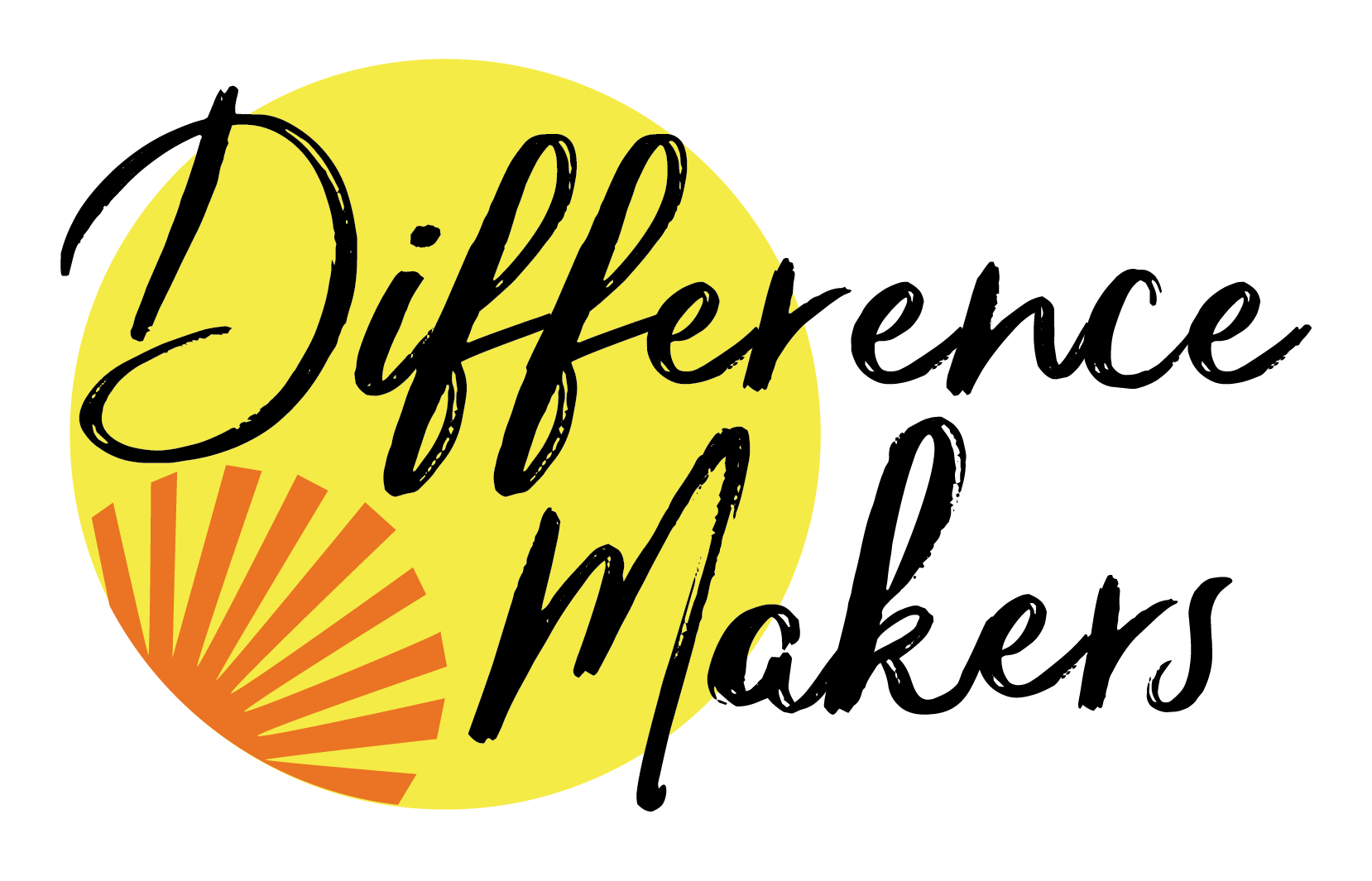
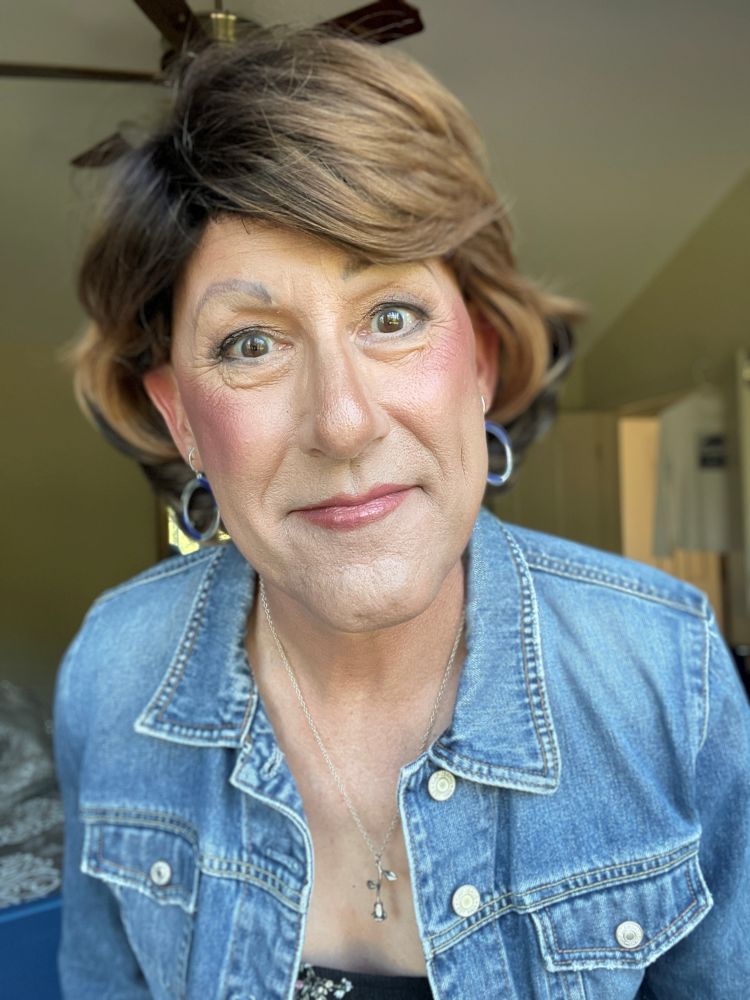

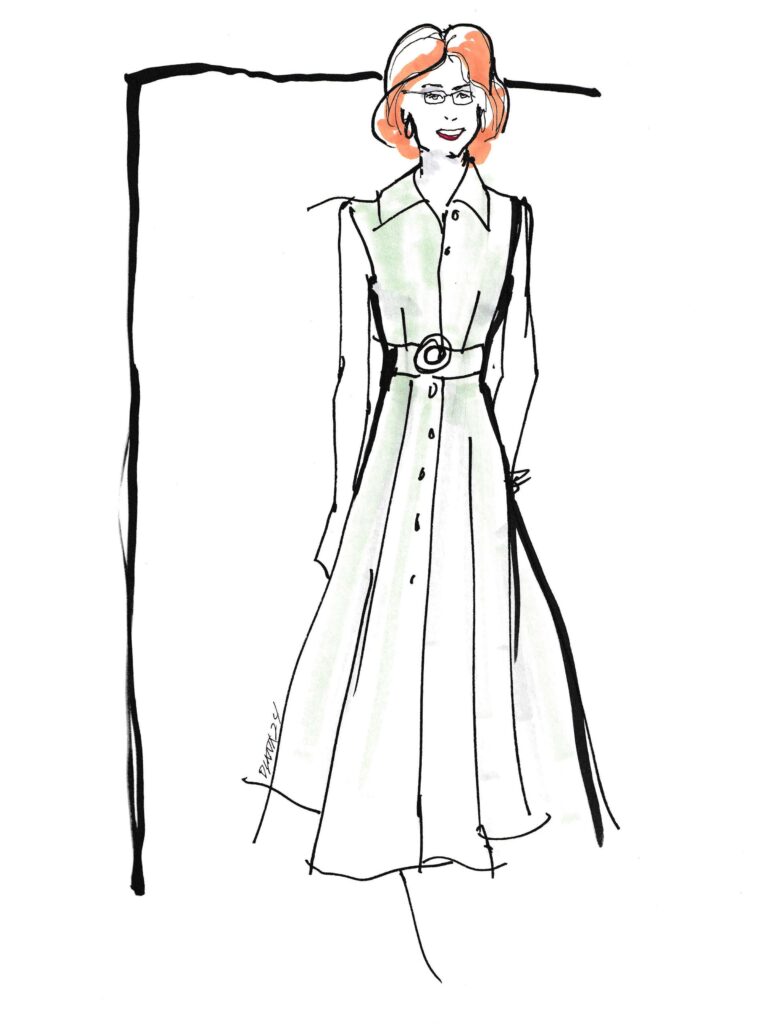


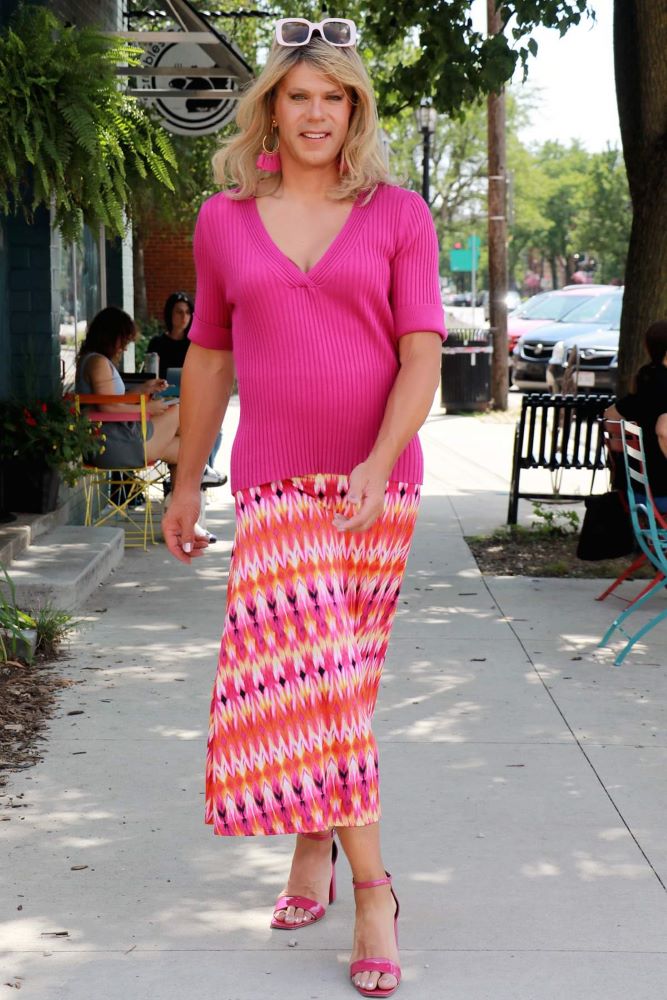


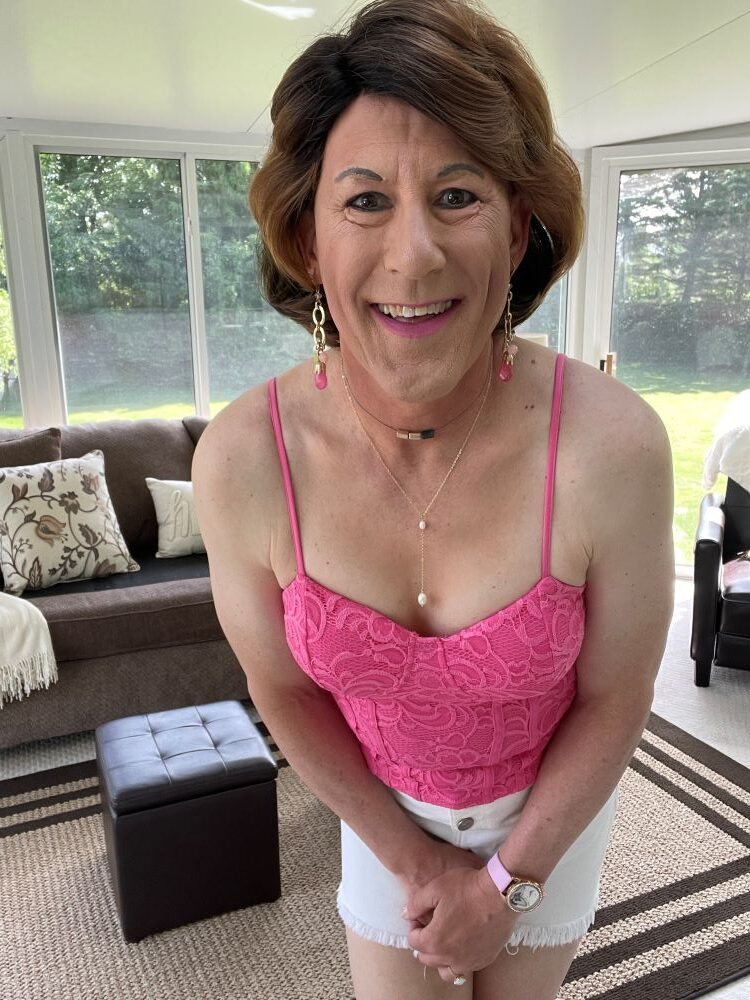

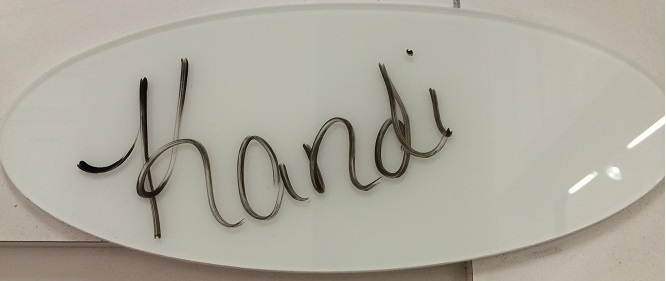
5 Responses
Sorry about that Kandi, it looks like the copy I have you had a couple of typos. Oh well, hope your readers will forgive me!
No problem whatsoever!! Thanks for the article and shining a light on an example.
Very interesting story thanks much for sharing
I actually may have a chance to participate in a panel at my company and discuss me being gender fluid and non binary
I never thought I would have such an opportunity
Rach, many of have seen and done thing we never thought imaginable. Life keep moving forward and we evolve and you are certainly an outstanding representative of our community.
Kandi,
The question of transgender people being more open and active in society than crossdressers has numerous answers but for me the obvious one is a transgender person usually has GD , if you can come to terms with that and accept it the next step is seeing if society will accept you . A crossdresser may not have GD , his/her needs could be driven by something different , it could be a fetish or purely sexual , there is therefore a greater fear of being exposed , he/she possibly wishes her needs to totally private . If he/she is exposed she risks being ridiculed and not only suffer embarrassment for herself but also her close family .
I enjoyed Jack/Jackie’s interview , the most obvious point is we gradually evolve I can she is gradually taking more steps but perhaps not in a direction she had considered at times , sometimes we just go with the flow and see where it takes us . I’m sure we all appreciate we put wives/partners in a difficult situation , the basic fact is we always want more so we have to consider can we keep everyone on board as our net gradually widens . I found we reach a point where our net is so wide it’s impossible to avoid someone who knows someone …….. . Can a marriage survive that , sadly mine couldn’t .
I must admit I’m still stuck on the old meaning of “QUEER” , I would strongly defend myself if I was given that label . I was born male but my wiring preferred being female , I do regret at times it taking so long to adopt that role but now I feel perfectly normal being Teresa , my passport and driving licence designate me female ( F) not queer (Q) . I don’t see the point of complicated labels , keep it simple and society will take you on board , complicate it and they will struggle to understand and reject you .